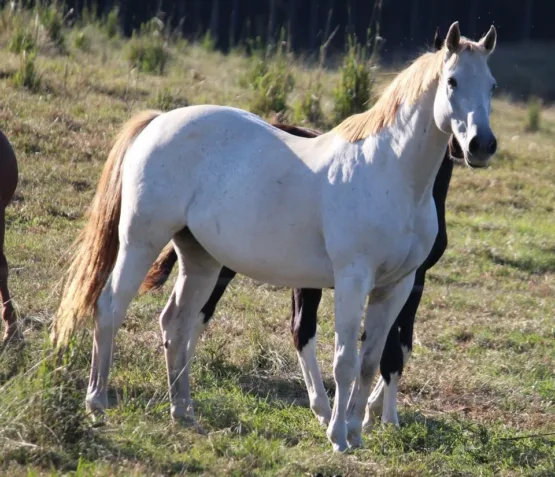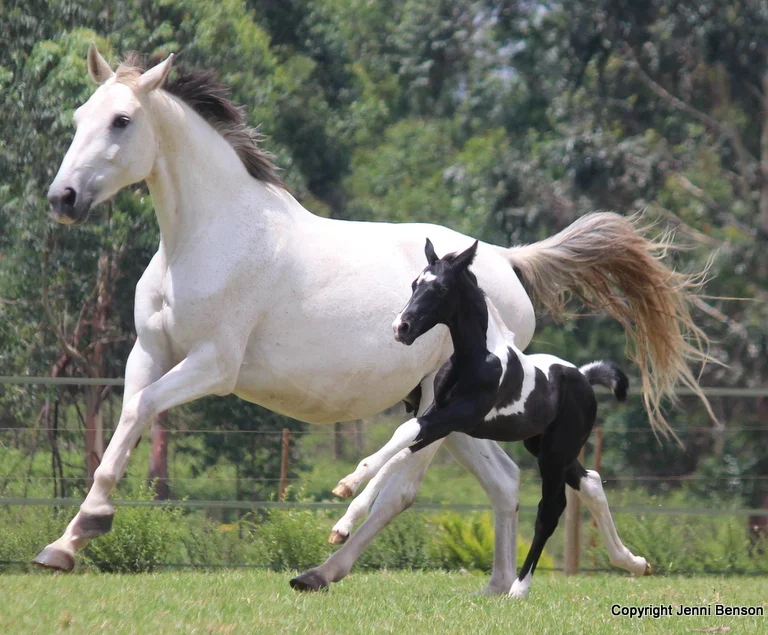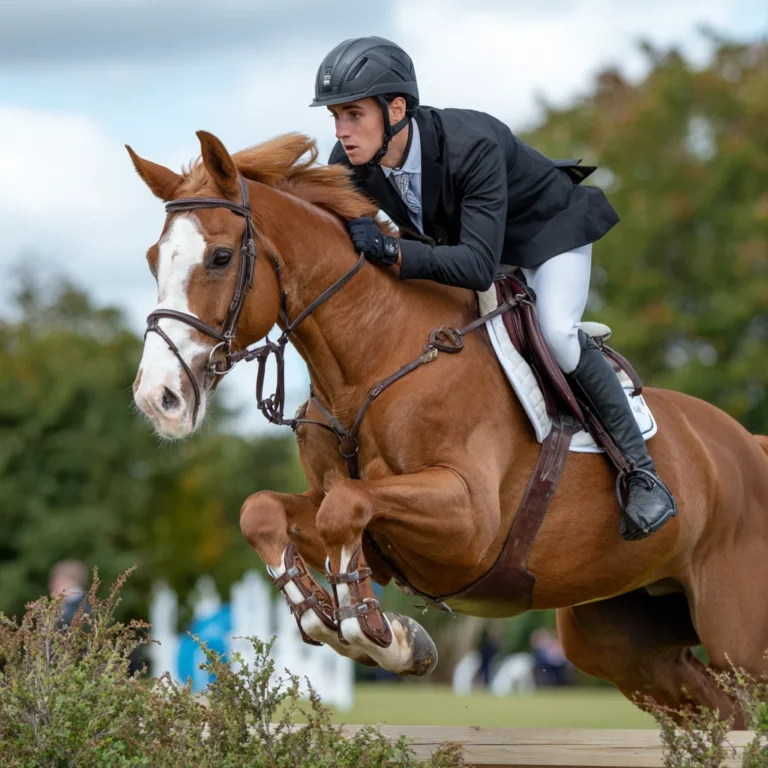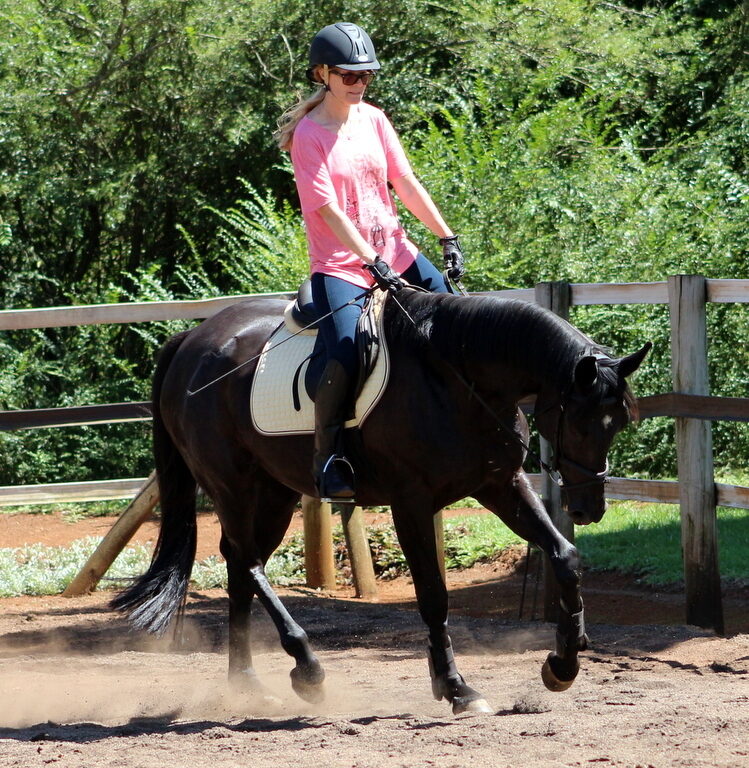HorseSpeak: Cracking the Code of Stress in Equines
Horses, known for their strength, grace, and stoic demeanor, often conceal their emotional and physical distress behind a façade of quiet resilience. Understanding and acknowledging the significance of recognizing stress in these majestic creatures is pivotal for any horse owner or enthusiast.
Being able to understand the subtle language of a stressed equine will show how your horse’s emotional well-being is intrinsically linked to his performance. Horses are prey animals by nature, wired to hide signs of vulnerability. This innate survival instinct makes it imperative for you as his caretaker to be able to pick up the nuanced indicators of stress.
The importance of knowing and understanding this is more than just looking after your horse’s mental health; it directly influences his physical vitality. If stress is left unaddressed, it can manifest in a variety of detrimental ways. It can compromise your horse’s immune system, impact his digestive health, and impede his ability to engage in normal, natural behaviors. Stress in horses is a silent disruptor, capable of sowing seeds of discomfort and ill-health.
The performance of your horse — whether in the competitive arena, during training sessions, or simply in his daily activities—can be profoundly affected by stress. A stressed horse may exhibit behavioral challenges, hindering his ability to learn, respond to cues, or cooperate with handlers. In a broader context, unrecognized and unmanaged stress can diminish your relationship with your horse.
By acknowledging the importance of recognizing stress in your horse, we take the first step towards fostering a deeper connection with your equine companion. In doing so, we honor their silent language and create an environment conducive to their physical well-being and optimal performance.
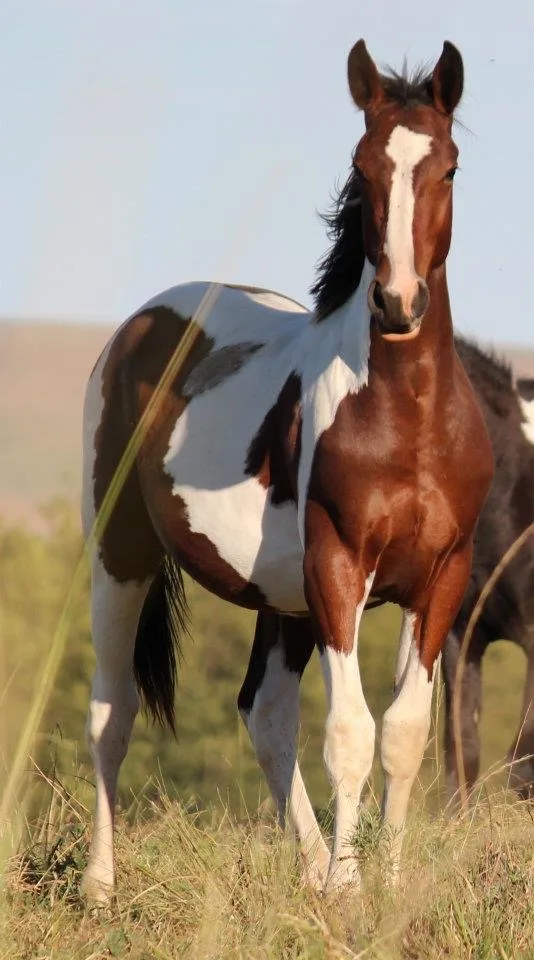
The impact of stress on equine well-being and performance
Within the fine lines of equine health, stress acts as a disruptive force that affects both the mental and physical spheres of a horse’s life. Understanding the far-reaching consequences of stress is paramount for anyone invested in the welfare of these magnificent animals.
- Physical Health: Stress has a profound impact on the physiological well-being of horses. The equine body responds to stress by releasing stress hormones, such as cortisol, which, when chronically elevated, can compromise the immune system. This weakened immunity opens the door to various health issues, from susceptibility to infections to delayed healing of wounds. Additionally, digestive health may suffer, leading to conditions such as colic or ulcers. The toll on their physical health underscores the urgency of identifying and addressing stress promptly.
- Behavioral Manifestations: Horses, being highly intuitive animals, often express their stress through behavioral changes. Agitation, restlessness, or withdrawal are common indicators of an underlying issue. These behavioral manifestations extend beyond mere nuisances; they are windows into the horse’s emotional state. For example, a stressed horse may become uncooperative during handling, exhibit resistance to training, or display stereotypic behaviors like cribbing or weaving. Recognizing these signs not only aids in early intervention but also enhances the quality of life for the horse.
- Impact on Learning and Performance: The mental and emotional toll of stress can significantly impede a horse’s ability to learn and perform. Horses under stress may struggle to concentrate, hindering their capacity to respond to cues effectively. In training scenarios, stress can erode the trust and communication between horse and handler, leading to a breakdown in the learning process. This, in turn, affects their performance in various activities, be it in the show ring, on the trail, or during routine tasks. Unraveling the intricate connection between stress and performance is pivotal for those aiming to bring out the best in their equine partners.
- Quality of Life: Beyond the physiological and behavioral aspects, recognizing the impact of stress is essential for enhancing the overall quality of life for your horse. A stressed horse may experience diminished joy and engagement in daily activities, impacting their ability to thrive mentally and emotionally. By addressing stress and promoting a harmonious environment, caretakers can contribute to a more fulfilling and enriched life for their equine companions.
In essence, the impact of stress on your horse’s well-being and performance is a complex interplay of physical health, behavior, and the quality of the human-equine partnership. As stewards of these remarkable creatures, it is our responsibility to grasp the depth of this impact and proactively work towards a state of balance and contentment for the horses in our care.
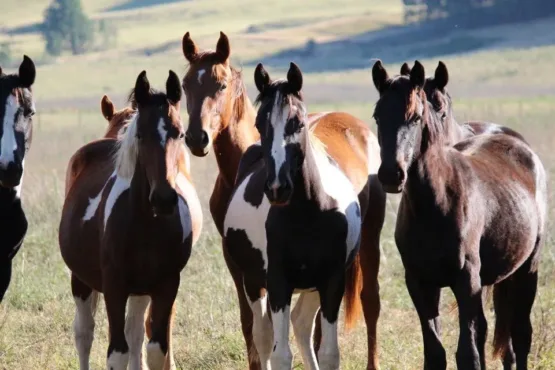
Definition of stress in horses
Stress in horses can be defined as a physiological and psychological response to any stimulus or situation that disrupts the horse’s equilibrium. It is essential to recognize that stress is a natural and adaptive part of life, even for horses. However, chronic or intense stress can lead to a range of health and behavioral issues.
In the context of horses, stress can manifest in various forms, affecting both their mental state and physical well-being. This includes heightened cortisol levels, changes in behavior, alterations in eating habits, and even modifications in physiological parameters such as heart rate and digestion. Understanding the nuanced ways in which stress manifests is crucial for horse caretakers to intervene appropriately.
Common causes of stress in equines
- Environmental Factors: Horses are highly attuned to their surroundings, and changes in their environment can be a significant source of stress. Examples include abrupt alterations in stable conditions, exposure to loud or unfamiliar noises, extremes in weather, or inadequate turnout space. Understanding the impact of the environment on equine stress is key to creating a stable and comfortable living space for horses.
- Social Factors: Horses are inherently social animals, and disruptions in their social dynamics can induce stress. Hierarchical changes within a herd, introduction of new horses, or separation from a companion can trigger social stress. Recognizing the importance of social interactions for horses helps caretakers address and manage stress arising from changes in their social environment.
- Health Issues: Physical discomfort or pain is a potent stressor for horses. Common health issues such as lameness, dental problems, or gastrointestinal disturbances can induce stress. Additionally, pre-existing health conditions or chronic ailments can contribute to a heightened state of stress. Regular veterinary check-ups and prompt attention to health concerns are critical components of stress prevention and management.
- Management Practices: The daily routines and management practices implemented by horse caretakers play a pivotal role in equine stress levels. Inadequate feeding schedules, abrupt changes in diet, or overly strenuous exercise routines can induce stress. Proper stable management, nutrition, and exercise tailored to individual needs contribute significantly to a horse’s overall well-being and stress resilience.
Understanding equine stress involves recognizing that it is a complex interplay of various factors, and horses may respond differently to similar stimuli. Each horse is an individual with its own personality, preferences, and tolerances. By being attuned to these nuances and considering the multifaceted nature of stress, caretakers can adopt a proactive approach to mitigate and prevent stress in their equine companions.
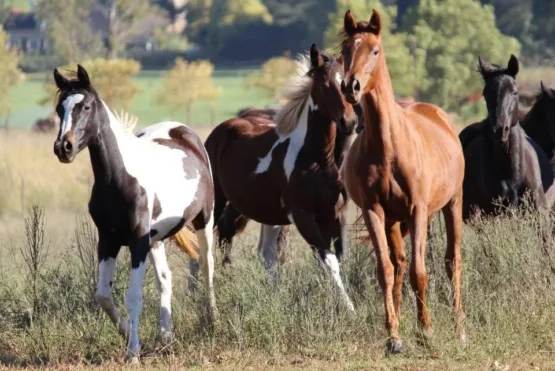
Behavioral cues
- Changes in Appetite: A horse’s appetite can be a telling indicator of its mental and emotional well-being. Stress may manifest as a sudden decrease in appetite or, conversely, as increased binge eating. Observing alterations in eating habits, such as picking at food, may signal underlying stress. Caretakers should be vigilant about changes in feed consumption and consider them as potential cues to the horse’s emotional state.
- Altered Social Interactions: Horses are inherently social beings, and stress can influence their interactions within a herd or with human caretakers. Social withdrawal, isolation, or avoidance of usual companions may indicate stress. On the other hand, aggressive behaviors or excessive submission can also be signs of social stress. Monitoring these shifts in social dynamics provides valuable insights into the horse’s mental state.
- Agitation or Lethargy: Behavioral changes such as heightened agitation or conversely, increased lethargy, can be indicative of stress. An ordinarily calm horse exhibiting restlessness, pacing, or excessive fidgeting may be signaling internal distress. Conversely, a typically energetic horse becoming unusually lethargic may also be expressing signs of stress. Recognizing these shifts in behavior helps caretakers address the underlying causes promptly.
- Repetitive Behaviors: Stress in horses can manifest in repetitive, stereotypic behaviors known as “vices.” These may include cribbing, weaving, pawing, or head-bobbing. Such behaviors often serve as coping mechanisms for stress and can become ingrained habits if the underlying stressors are not addressed. Identifying and mitigating the root causes can help alleviate these repetitive behaviors.
Physical Indicators
- Changes in Coat Condition: The condition of a horse’s coat is a reflection of its overall health, and stress can manifest as changes in coat quality. A once glossy coat becoming dull, rough, or developing uneven patches may be indicative of stress. Additionally, increased shedding, particularly out of season, can be a physical response to elevated stress levels.
- Weight Loss or Gain: Fluctuations in weight, whether noticeable weight loss or unexpected weight gain, can be signs of stress. Stress can affect a horse’s metabolism and eating habits, leading to changes in body condition. Monitoring weight, especially in conjunction with alterations in appetite, provides crucial information about the horse’s physical well-being.
- Digestive Issues: Stress has a direct impact on the digestive system of horses. Common digestive issues associated with stress include colic, ulcers, or diarrhea. Changes in manure consistency, frequency of bowel movements, or signs of discomfort during defecation should be closely observed as potential indicators of stress-related digestive problems.
- Lameness or Stiffness: Stress can contribute to physical ailments such as lameness or stiffness. Chronic stress may exacerbate existing musculoskeletal conditions or contribute to the development of new issues. Observing changes in gait, reluctance to move, or signs of discomfort during exercise can provide valuable clues to the horse’s physical state.
Understanding these subtle signs of stress requires keen observation and familiarity with the individual horse’s baseline behaviors. By combining insights from both behavioral cues and physical indicators, caretakers can gain a holistic understanding of the horse’s well-being and fully address stress.
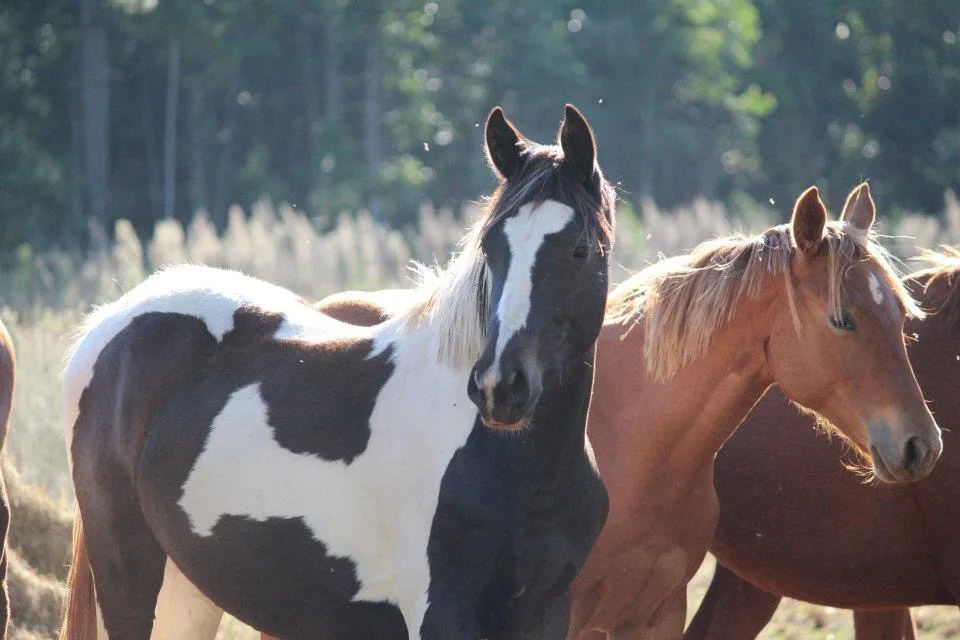
recognizing stress in different settings
Stress in the Stable
- Stall Behaviors: The stable environment plays a crucial role in a horse’s daily life, and changes in stall behaviors can be indicative of stress. Restlessness, constant pawing, circling, or cribbing within the stall are common signs. Conversely, a horse that becomes unusually withdrawn, standing in a corner or refusing to lie down, may also be exhibiting stress. Monitoring these behaviors helps caretakers identify and address stressors within the stable.
- Bedding Preferences: Horses often have preferences for specific types of bedding, and changes in bedding can contribute to stress. Some horses may prefer softer materials, while others may prefer straw or shavings. Observing whether a horse avoids lying down or appears uncomfortable in its stall can provide insights into potential stress related to bedding.
- Lighting and Ventilation Considerations: The lighting and ventilation in the stable can impact a horse’s comfort and stress levels. Inadequate natural light or poor ventilation may contribute to stress. Horses are sensitive to changes in their environment, and adjusting lighting schedules or ensuring proper airflow can be important considerations to reduce stress in the stable.
Stress During Transportation
- Trailering Behaviors: Trailering is a common source of stress for horses, and their behaviors during transportation can offer crucial insights. Signs of stress may include sweating, rapid breathing, pawing, or vocalization. A normally calm horse that becomes agitated or refuses to load may be experiencing stress related to travel. Observing these behaviors and addressing them promptly can improve the overall travel experience for the horse.
- Strategies for Reducing Travel Stress: Implementing strategies to reduce travel stress is essential. This may involve gradual desensitization to the trailer, ensuring a comfortable and well-ventilated transport vehicle, and providing familiar items such as hay or a companion horse. Regular breaks during long journeys and gentle driving practices can also contribute to a positive travel experience, minimizing stress for the horse.
Social Stress
- Hierarchy and Dominance Issues: Horses are social animals with a hierarchical structure within a herd. Changes in hierarchy or dominance can lead to stress. Signs of social stress may include increased aggression, submissive behaviors, or isolation from the herd. Observing alterations in social dynamics and addressing potential conflicts promptly can help mitigate stress within the herd.
- Introducing New Horses: The introduction of new horses to an existing herd is a delicate process that can cause stress for all involved. Signs of stress during introductions may include aggressive behaviors, chasing, or avoidance. Gradual introductions with visual barriers, monitored interactions, and providing sufficient space for each horse can ease the transition and reduce stress.
Recognizing stress in different settings requires a keen understanding of a horse’s natural behaviors and an awareness of how changes in their environment can impact their well-being. By being attuned to these specific contexts, caretakers can proactively address stressors and create environments that promote the mental and physical health of their equine companions.

Environmental Modifications
- Proper Stable Management: Proper stable management is fundamental to creating a stress-free environment for horses. This includes maintaining clean, well-ventilated stables with appropriate lighting. Regular cleaning of stalls, providing comfortable bedding, and ensuring a consistent routine contribute to a stable environment that promotes relaxation. Minimizing abrupt changes in the stable setup and introducing enriching elements, such as toys or boredom busters, can engage the horse mentally and alleviate stress.
- Pasture and Turnout Considerations: Access to pasture and turnout is vital for the mental and physical well-being of horses. Adequate space for movement, grazing, and social interactions in a safe environment can significantly reduce stress. Careful management of pasture conditions, rotational grazing to prevent overgrazing, and addressing potential hazards contribute to a positive turnout experience. Additionally, horses benefit from the natural stimulation of varied terrain and exposure to sunlight.
Social Interactions
- Group Dynamics and Compatibility: Horses thrive on social interactions, and understanding group dynamics is essential for stress reduction. Grouping horses based on compatibility and temperament minimizes the risk of conflicts. Monitoring herd interactions allows caretakers to intervene if hierarchy shifts or if a horse is being consistently bullied. Providing adequate space for each horse in the group promotes a more harmonious social environment, reducing stress related to social dynamics.
- Providing Companionship: Horses are naturally social animals and benefit from companionship. Loneliness and isolation can lead to stress, so ensuring horses have compatible companions is crucial. Whether through pasture turnout or stable neighbors, having a companion helps mitigate feelings of isolation. It’s important to consider the individual preferences and personalities of horses when pairing them to enhance positive social interactions.
Health and Nutrition
- Balanced Diet and Feeding Routines: A balanced and consistent diet is essential for equine well-being and stress management. Providing high-quality forage, and appropriate concentrates, and ensuring access to clean water supports a horse’s physical health. Establishing regular feeding routines helps minimize stress associated with hunger or irregular meal schedules. Slow feeding methods, such as using hay nets, encourage natural foraging behaviors and contribute to a more contented horse.
- Regular Veterinary Check-Ups: Regular veterinary check-ups are preventive measures that contribute to stress reduction. Routine health assessments, dental care, vaccinations, and parasite control are essential components of equine healthcare. Detecting and addressing potential health issues early prevents chronic discomfort or pain, minimizing stress and promoting overall well-being.
Training and Exercise
- Positive Reinforcement Methods: Positive reinforcement training methods focus on rewarding desired behaviors, creating a positive association with training sessions. This approach fosters trust and cooperation, reducing stress associated with negative experiences. Using rewards such as treats or praise reinforces good behavior and encourages a more positive mindset in the horse.
- Tailoring Exercise Routines to Individual Needs: Each horse is unique, and their exercise routines should be tailored to their individual needs and abilities. Recognizing physical limitations and adjusting training intensity and duration accordingly prevents undue stress. Providing varied and mentally stimulating exercises, such as trail rides or obstacle courses, enhances the horse’s overall well-being and reduces the monotony of repetitive training.
By implementing these strategies, caretakers can create an environment that addresses the diverse needs of horses, both mentally and physically. The holistic approach to equine care, encompassing environmental, social, health, and training considerations, contributes to stress reduction and fosters a positive and fulfilling life for the horse.
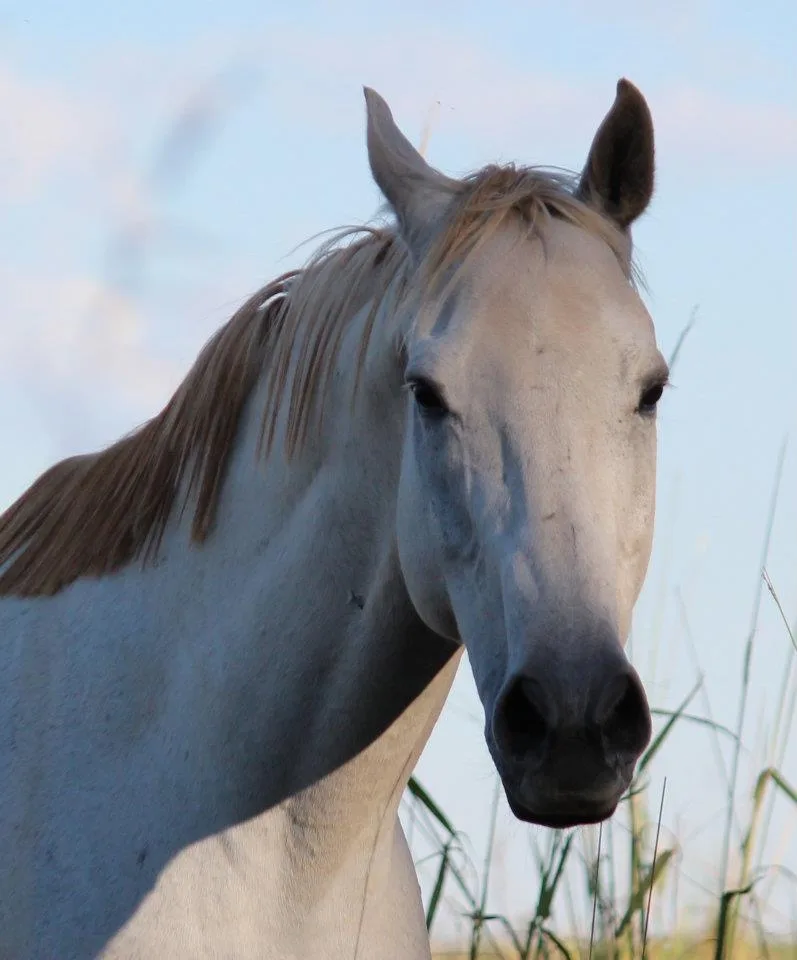
Real-life examples of horses experiencing and overcoming stress
- Case Study: Luna’s Transition to a New Environment: Background: Luna, a 7-year-old mare, faced stress during her transition to a new stable environment. She exhibited signs of restlessness, decreased appetite, and social withdrawal. Strategy: Caretakers gradually introduced Luna to her new surroundings, starting with short turnout sessions in a small paddock before integrating her into the main herd. Providing a companion horse for company eased her loneliness. Additional environmental enrichment, such as hanging toys and adjusting lighting, helped Luna acclimate. Over time, her stress indicators diminished, and she integrated well into her new home.
- Case Study: Max’s Trailering Anxiety: Background: Max, a 10-year-old gelding, displayed heightened stress during trailering, exhibiting sweating, pacing, and refusal to load. Strategy: Caretakers implemented a systematic desensitization program, gradually introducing Max to the trailer without immediate travel. Positive reinforcement, such as treats and praise, rewarded calm behavior around the trailer. The caretakers ensured the trailer was well-ventilated and spacious. Through patient and consistent efforts, Max’s trailering anxiety reduced, and he eventually loaded and traveled more comfortably.
Highlight successful strategies employed in specific situations
- Enrichment for Stable-bound Horses: Scenario: Horses confined to stalls for extended periods may experience stress and boredom. Strategy: Implementing environmental enrichment, such as hanging hay nets, treat balls, or puzzle feeders, engages horses mentally and physically. Rotating toys regularly prevents monotony. Additionally, playing soothing music or providing a view of outdoor activities can alleviate stall-related stress. This strategy has successfully transformed restless stall behaviors into positive, stimulating activities.
- Social Integration for New Horses: Scenario: Introducing a new horse to an existing herd can lead to social stress and conflicts. Strategy: Gradual introduction with visual barriers allows horses to acclimate to each other’s presence before direct contact. Observing and intervening in early signs of aggression prevents escalated conflicts. Providing multiple feeding stations and ensuring adequate space for all horses fosters a positive social environment. This approach has successfully facilitated the integration of new horses without causing undue stress.
- Balanced Diet for Weight Management: Scenario: Horses experiencing weight loss or gain due to dietary imbalances may exhibit stress-related behaviors. Strategy: Consulting with a nutritionist to formulate a balanced diet tailored to each horse’s needs helps address weight-related stress. Ensuring access to quality forage, appropriate concentrates, and consistent feeding routines contributes to overall health and weight management. This strategy has proven successful in restoring healthy body conditions and alleviating stress associated with nutritional imbalances.
- Positive Reinforcement in Training: Scenario: Horses undergoing training may exhibit stress-related resistance or anxiety. Strategy: Adopting positive reinforcement training methods, such as clicker training or using treats as rewards for desired behaviors, establishes a positive association with training sessions. Breaking down tasks into manageable steps and rewarding incremental progress reduces performance-related stress. This strategy has successfully transformed tense or anxious horses into willing and engaged learners.
These case studies and highlighted strategies demonstrate the diverse ways in which stress can be recognized, addressed, and mitigated in horses. By tailoring interventions to the individual needs and circumstances of each horse, caretakers can successfully navigate and overcome various stressors, enhancing the overall well-being of their equine companions.
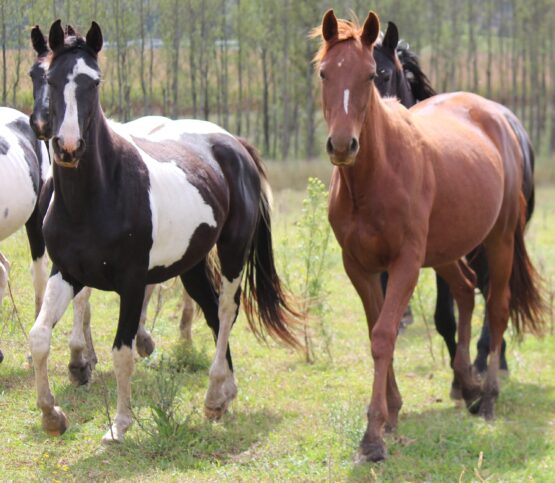
Conclusion
Key Signs of Stress in Horses
In our exploration of recognizing and alleviating stress in horses, we’ve unveiled a myriad of subtle signs that serve as silent messengers of equine distress. From behavioral cues like changes in appetite, altered social interactions, and repetitive behaviors to physical indicators such as shifts in coat condition, weight loss or gain, and digestive issues, these nuanced signals form a tapestry of insight into a horse’s well-being.
Importance of Proactive Management to Enhance Equine Well-being
Understanding the impact of stress on equine health and performance underscores the paramount importance of proactive management. Caretakers play a pivotal role in creating environments that foster physical and mental equilibrium. Whether through proper stable management, thoughtful social integration, a balanced diet, or positive reinforcement training, the strategies employed in equine care should be tailored to individual needs.
By addressing stressors before they escalate, caretakers contribute not only to the immediate alleviation of stress but also to the prevention of potential health and behavioral issues. Proactive management is the cornerstone of equine well-being, forging a path toward contented, thriving horses.
Encouragement for Readers to Share Their Experiences and Seek Professional Advice if Needed
As fellow stewards of these magnificent creatures, our journey in understanding equine stress is a collective one. We encourage you, our readers, to share your experiences and insights. Each horse is unique, and your stories may illuminate new facets of equine well-being.
Remember, the journey of caring for horses is dynamic and ongoing. If you ever find yourself faced with challenges or uncertainties, seeking professional advice is a wise step. Veterinarians, equine behaviorists, and experienced trainers can provide valuable guidance tailored to the specific needs of your horse.
In conclusion, let us embark on this journey of equine care with open minds and compassionate hearts. By recognizing, understanding, and proactively managing stress, we cultivate an environment where horses not only survive but thrive, forging bonds of trust and companionship that endure a lifetime. Together, let’s champion the well-being of these remarkable beings, ensuring a future where horses live their best lives.
Further reading
Recognizing Stress in HorsesNever the less, horses can show signs of stress at home on a daily basis in some cases. Horses that are experiencing stress may offer many signs to its owner
How to tell if you have a stressed horse and ways to help Signs of acute stress in horses · Nipping · Tail swishing · Difficult to catch · High head and neck position · Ears pricked tightly forward · Worried expression …
Equine Body Language: 7 Signs to Recognize – Horses in acute stress display fairly recognizable body language, says McDonnell. They might have forward-pointing ears, wide-open eyes, widened nostrils, a …

